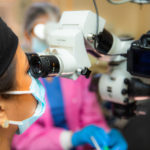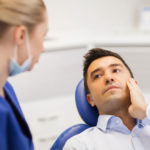Most people would never think twice to deal with an infection on their skin or on a body part. So why do so many individuals overlook signs of an abscessed tooth? Many do not realize that abscesses are signs of an oral infection that must be addressed with the help of a trained doctor experienced in abscessed tooth treatments in Midtown Manhattan, NY.
Why Do Tooth Abscesses Occur?
Bacteria live and grow in a person’s mouth under normal conditions. However, some types of bacteria build up and cause problems like tooth abscesses.
A tooth abscess occurs when bacteria start to breed under the gums, within the tooth pulp, near the tooth root, or a combination of those places. Tooth abscesses take time to develop, which is one of the reasons that many people do not realize they have a tooth abscess until the situation has become severe.
Will There Be Physical Signs Indicating I Have A Tooth Abscess?
If a person or their loved one experiences a tooth abscess, they will probably have a number of indicators.
These “red flags” can include heightened tooth sensitivity, sharp or dull pain in and around the abscess, inability to bite down on their tooth, discharge draining from their gums, an unpleasant smell coming from the area of pain, gum redness and swelling, fevers without any apparent source, swelling in their jaw, and teeth that feel loose. Plus, people may even be able to see the abscess in the form of a bump under their gums.
People should remember that dental pain and discomfort are never normal and should never go without a diagnosis. A doctor can use technologically-advanced tools to find out if patients have a tooth abscess. If they do, the doctor will likely recommend a common type of abscessed tooth treatment in Midtown Manhattan, NY.
What Are Common Tooth Abscess Treatments?
Below are some of the most common types of treatments used to comfortably and completely resolve a patient’s tooth abscess so the infection does not have the chance to spread – or spread further than it already has.
Antibiotics:
It is very normal for a doctor to prescribe antibiotics if a patient’s infection is not limited to the site of their abscessed tooth. Patients should be sure to take the full course of antibiotic treatment as prescribed.
Incision and Drainage:
An abscess is usually filled with pus. Removing the pus using a incision and drainage procedure relieves the pressure in a patient’s mouth. It also allows the doctor to irrigate and sanitize the inside of the abscess. After patients have been given a form of sedation dentistry, the doctor can make a small incision to access the abscess and drain it. The process can help the patient’s body heal faster and leaves them with less discomfort.
Root Canal Therapy:
Patient’s may be told that they need a root canal treatment as a part of their tooth abscess treatment. No need to worry, a root canal treatment is pain-free and safe! It helps save a patient’s tooth structure, too.
Endodontic Surgery:
If a patient’s tooth root has been damaged by bacteria, a doctor may want to perform endodontic surgery. Endodontic surgery involves exposing and removing the damaged tooth root apex and then replacing it with a root-end filling.
Tooth Extraction:
Keeping a patient’s natural teeth in place is always a doctor’s first goal. At times, though, tooth abscesses may have left too much damage. In that case, a tooth extraction may be the most suitable option.
Come To Our Office For Tooth Abscess Treatments In New York, NY
Any time you have a major change in your mouth, such as the onset of pain and sensitivity in and around a tooth, feel free to call a doctor. The sooner a doctor like our experienced endodontist, Dr. Bose Pillai, can diagnose your underlying condition, the better your outcomes are likely to be.
Get in contact with Dr. Mahua Bose Pillai and our team of professionals at our Advanced Endodontics of New York office to schedule an appointment today!
Dr. Pillai earned her Masters in Medical Sciences (MMSc) in Endodontics at the Harvard School of Dental Medicine. She stays current with the latest techniques and technologies to give patients the best treatment outcomes.






